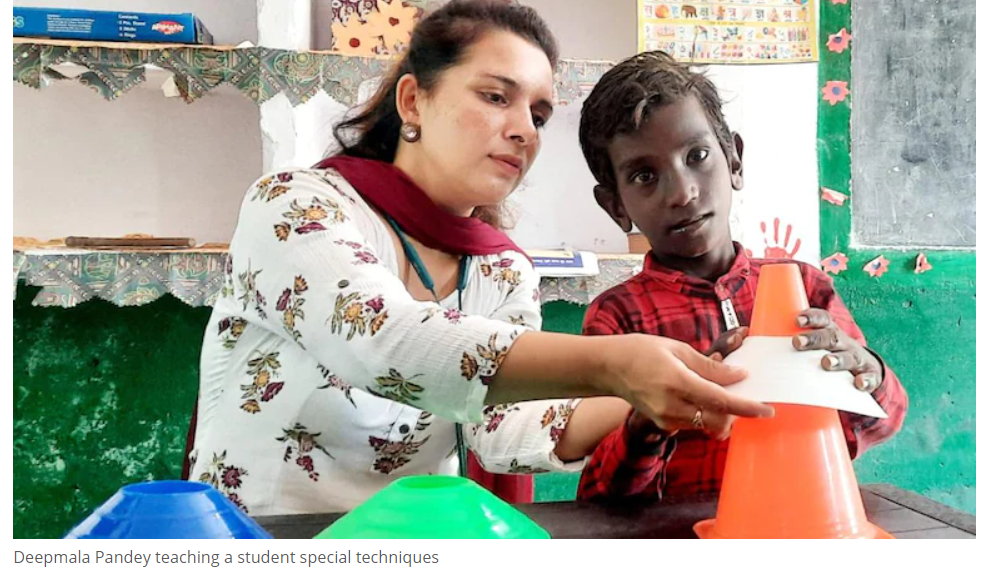In 2018, a teacher from Bareilly began a campaign to push for inclusive education. Today, it is supported by 350 of her colleagues and has enrolled over 600 children with special needs in various schools.
On September 26, on his Mann ki Baat programme, Prime Minister Narendra Modi put the public spotlight firmly on an English-medium primary school in Dabhaura Gangapur village, about 30 km from Bareilly district headquarters. A campaign launched by the school’s principal—‘One Teacher, One Call’ by 35-year-old Deepmala Pandey—is pushing to increase the enrolment of differently-abled students in schools. Since her campaign was launched, in 2018, about 350 teachers have signed on and more than 600 differently-abled students have been enrolled.
Pandey was transferred to Dabhaura Primary School in 2015. In 2018, the arrival of Anmol, a child with learning disabilities, changed her understanding of teaching. Given the challenges Anmol faced, it was not easy to integrate him into the regular programme. He could not speak, and it was difficult to help him understand what was being said. What Pandey realised was that she needed to adapt the teaching styles to Anmol’s needs. After a few days, she managed to teach him a few sign language symbols, and communication began. Three years later, Anmol is in class three, and participates in all the school activities, as well as in classes like PT and Yoga. He loves being at school—his attendance is over 90 per cent—and has been awarded Rs 5,000 as a scholarship by the state government. Another student at Pandey’s school—Atul, who is in class one and also battling learning difficulties—won a consolation prize at a district-level art competition in December 2019.
At the national level, there is already legislation to support children with learning difficulties (or CWSN, children with special needs, in official parlance). This is the ‘Right of Persons with Disabilities Act, 2016’ (RPWD Act), which includes provisions for such children to be enrolled in both regular schools and in special schools. There are 21 categories of recognised disabilities, ranging from blindness to autism, cerebral palsy and others. (It was under this scheme that Anmol enrolled in Dabhaura Gangapur’s English-medium primary school in 2018.)
After finding out that the RPWD Act was not well-known in the teaching community, Pandey began her campaign to connect children with special needs to schools that could admit them. She realised that teachers would have to spearhead the enrolment push, and also that new teaching models would have to be developed to make sure that children with special needs were learning at the same tables as general students.
In April 2018, Pandey and a few other teachers from Bareilly began a group on WhatsApp to push for inclusive education. Today, it has grown to over 350 members, and features both awareness-building posts and supporting information, like classes or class activities that can accommodate both general category children and those with special needs. In the three years since the group was formed, Pandey—who has had some training on the subject—has structured disabled-friendly activities for young children around the STEM (Science, Technology, Engineering, Maths) subjects. All manner of things become teaching aids, like clay tablets, plastic glasses, newspapers, beads, straws. These activities help brain development for children at the primary school level, and can be done by both disabled children and those without learning difficulties. Pandey has also opened a reading corner with a book bank for children at her school, and activities like poster-making, drawing competitions and sports are held every week.
Under her ‘One Teacher One Call’ campaign, members are asked to call at least one other teacher and explain why it is so important for children with special needs not to be deprived of admission to regular schools, and that there is a Central Act to support such enrolments. The campaign took a major hit due to the pandemic, when all schools were closed in April 2020. Nonetheless, Pandey’s campaign has adapted—more than 5,000 children with special needs have been lined up for online admission, and 600 have already been enrolled. “People with mental disabilities are those who cannot see the ability in people with special needs,” says Pandey firmly. Her clarity about the importance of inclusive education—and her success in doing something about the problem—show why she is most certainly a special educator.
Article Credit: indiatoday
